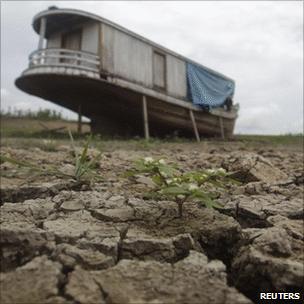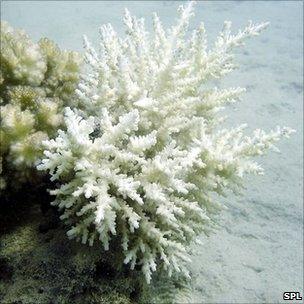2010 sets new temperature records
- Published

An intense drought in part of the Amazon basin is among recent weather extremes
Temperatures reached record levels in several regions during 2010, the World Meteorological Organization (WMO) says, confirming the year is likely to be among the warmest three on record.
Parts of Russia, Greenland, Canada, China, North Africa and South Asia all saw the mercury soar to record levels.
The three main temperature records show 2010 as the warmest, or joint warmest, year in the instrumental record.
The UK Met Office suggests 2011 will be cooler, as La Nina conditions dominate.
This brings colder than average water to the top of the eastern Pacific Ocean, which lowers temperatures globally.
The two leading US analyses of global temperature show that up until the end of October, 2010 was the warmest year in the instrumental record going back to 1850.
The global average temperature was 0.58C above the average for 1961-90 according to Nasa, while the National Oceanic and Atmospheric Administration (Noaa) put the figure at 0.54 above.
The UK record, kept by the Met Office and the Climatic Research Unit (CRU) at the University of East Anglia, has 2010 in joint first place with the El Nino-dominated year of 1998.
The Met Office released its own analysis last week.
But with La Nina conditions continuing, 2010 could slip back into second or third place by the time data for November and December is included, it says.
If La Nina continues into next year, as expected, that could make 2011 cooler than 2010 - though still well above the 1961-90 average.
The UK itself, meanwhile, is on course to see the coldest year since 1996, due to the state of the North Atlantic Oscillation (NAO) - a weather phenomenon that affects the distribution of heat within the northern hemisphere.
CRU's Professor Phil Jones - one of the scientists at the centre of the "ClimateGate" issue earlier in the year - cautioned that annual temperatures were not a good indicator of the progression of global warming as driven by greenhouse gas emissions.
"Year-to-year variability is dominated by features such as the NAO and El Nino," he told BBC News.
"But if you want to look at the underlying trend, you need to look at the decadal timescale, and that's when you detect the anthropogenic influence.
"In terms of looking at recent years, 1998 was the most anomalous - the remaining top 10 warmest years in the series have all occurred since 2000."
Cancun message
The WMO highlighted weather extremes in several parts of the world during 2010, which it says are consistent with the picture of man-made global warming.
In July, temperatures in Moscow soared 7.6C above normal, beating the previous record by 2C.

Coral bleaching was observed in many parts of the tropics, similar to 1998
Some other parts of western Russia encountered summer temperatures 5C above normal.
Pakistan experienced the worst floods in its documented history, the WMO says, while parts of the Amazon saw a serious drought.
Canada as a whole experienced its warmest year in the instrumental record.
"Only limited land areas had below-normal temperatures in 2010," the WMO concludes.
Professor James Crabbe from the UK's University of Bedfordshire said high temperatures in the oceans had done severe damage to coral reefs.
"Coral bleaching has been observed in every ocean and major sea in which coral occurs, from the Persian Gulf to southeast Asia, the Central Pacific to the Caribbean - only the second time this has happened, the first being 1998," he said.
"This has serious implications for the many populations - about one billion people - who live near coral reefs and rely on them for their livelihoods and nutrition."
The WMO released the findings - as it always does - during the annual UN climate meeting, held this year in Cancun, Mexico.
Professor Mark Maslin, director of the Environment Institute at University College London, said negotiators should pay renewed attention to the data.
"Those who hoped that global warming would just go away will be disappointed by today's announcements," he said.
"It shows that the science underpinning the negotiations at Cancun is correct, and adds further weight to the need for a globally negotiated and accepted deal on carbon emissions."